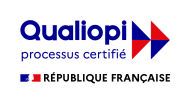Training objective
Some non-IT projects can be managed using Agile methods. This training will enable you to know when to recommend Agility in your industry (which project/team), where and how to deploy it in your organisation, and then how to evaluate the relevance of Agile practices implemented by a project team.
You will not become an Agilist, but you will be able to identify projects that can benefit from Agility and supervise, support its deployment in industrial and R&D settings.
Become an indirect but driving force for Agility, be able to audit an Agile project and its management
You will know how to 1) evaluate whether Agility is needed on a project, 2) enable and foster its deployment, and 3) assess the quality of its Agile management in order to advise the team on areas for improvement and inform management and cross-functional departments on the quality of Agile practices (with a view to improvement, training, or return to traditional management).
1) Recommend Agility for hardware and hybrid projects
You will have clear indicators to evaluate the suitability of Agile management according to project types, and the profile of solutions to implement for this management (the differences with traditional management in R&D and industrial contexts).
2) Evaluate Agility in industrial teams
Assess the relevance and quality of the Agile management put in place by engineering and R&D project teams.
3) Propose corrections and improvements
Advise the team on their strengths and, with constructive and fact-based arguments, suggest areas for improvement and necessary corrections to strengthen Agile adoption across technical departments.
Learning objectives
- Understand how Agility can work in your industrial domain for non-IT hardware projects123
- Know how to identify projects that can benefit from Agility in your industrial sector123
- Differentiate Agility at the project level, project management level, and governance level123
- Know how to evaluate the quality of Agile management in R&D and engineering teams123
- Be able to recommend areas for improvement towards more effective Agile practices123
Assessment method: 1 - Assessed by the trainer during exercises and questions. 2 - Validated during the end-of-training quiz and its debrief. 3 - Self-assessed with the self-audit document.
(Self-)assessments and debriefs contribute to the acquisition and validation of skills.
Key topics and keywords
Management, Agility, Evaluation, Audit, Teams, Hybrid projects, R&D, Industry, Non-IT
Target audience
Managers seeking to evaluate and foster Agility within their R&D and industrial teams
Profiles: Manager, R&D Director, Department Head, Executive, VP Engineering
Prerequisites: No prerequisites related to the training subject
Practical information
1 day (7h). In-company training (at your premises) or Open training ( Next: 6 Apr 2026 ONLINE ).













